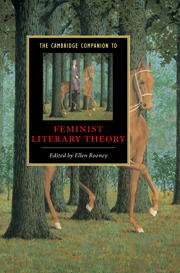Introduction
Published online by Cambridge University Press: 28 November 2006
Summary
Feminist literary theory resists generalization. Perhaps because feminism has been such a prolific intellectual current and also because feminist critics have produced work of such extraordinary diversity, a remarkable range of scholars have tried to abstract the essential elements of feminist literary theory over the past two decades and more. Some of these scholars have worked in the mode of the collection or anthology, others by attempting their own synoptic analyses; at least one published a collection studying already existing critical anthologies. Virtually all such efforts have been subject to strenuous critique and symptomatic reading, but they have simultaneously made important, even profound, interventions in the academic field of feminist criticism and beyond. Indeed, it may well be a rule of intellectual life that those books that are at some point most energetically critiqued, or even condemned, are precisely those whose very powerful impact must be, at whatever cost, undone, displaced, disavowed, in order to enable new work to find its point of departure.
Nevertheless, a glance over the history of efforts by feminist literary theorists to summarize their collective project reveals a marked and growing concern over the very possibility of such a synoptic view, a concern mirrored in the questions readers raise about the terms of inclusion and exclusion that govern any attempt to define the borders of feminism.
- Type
- Chapter
- Information
- The Cambridge Companion to Feminist Literary Theory , pp. 1 - 26Publisher: Cambridge University PressPrint publication year: 2006
- 2
- Cited by



